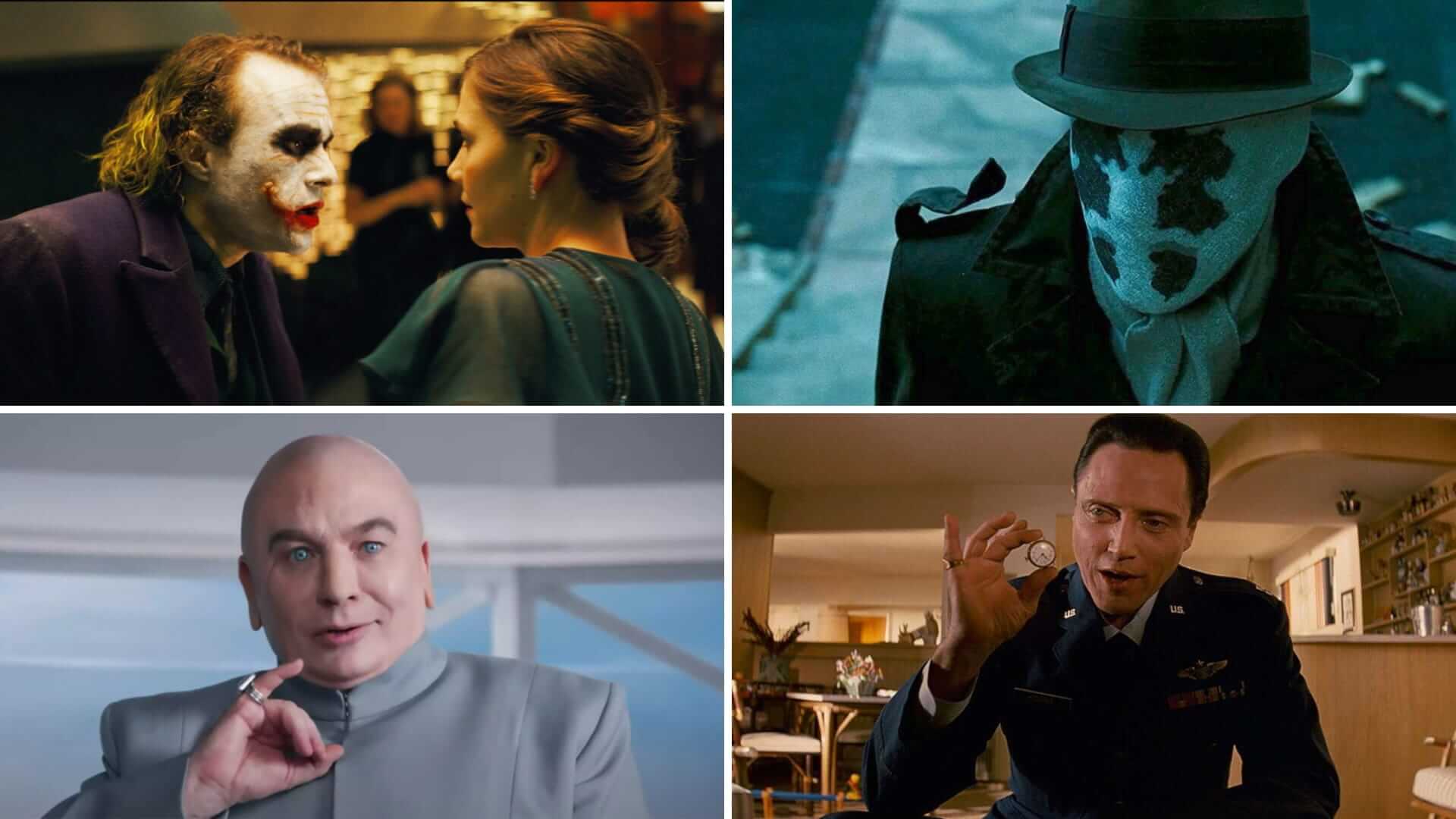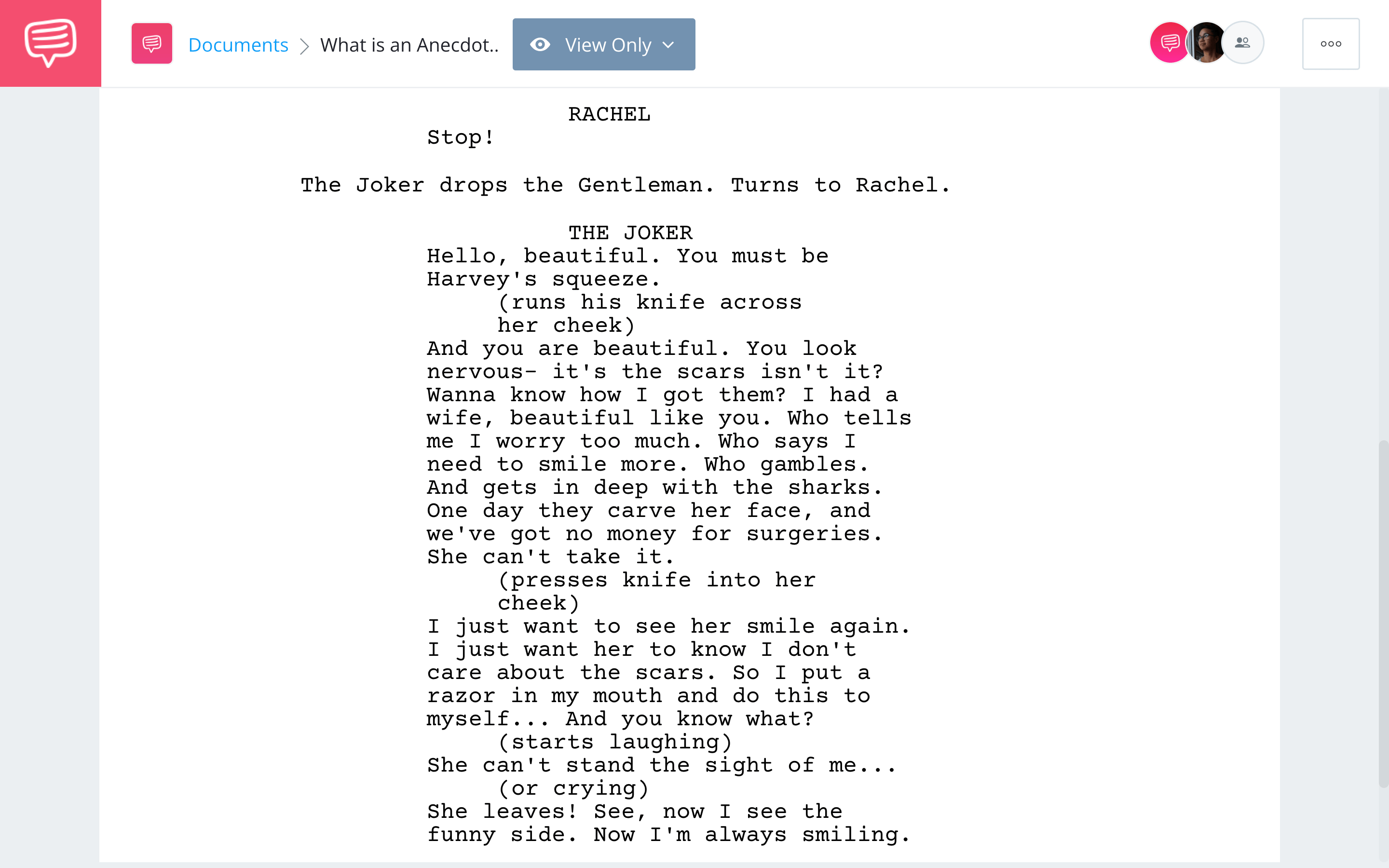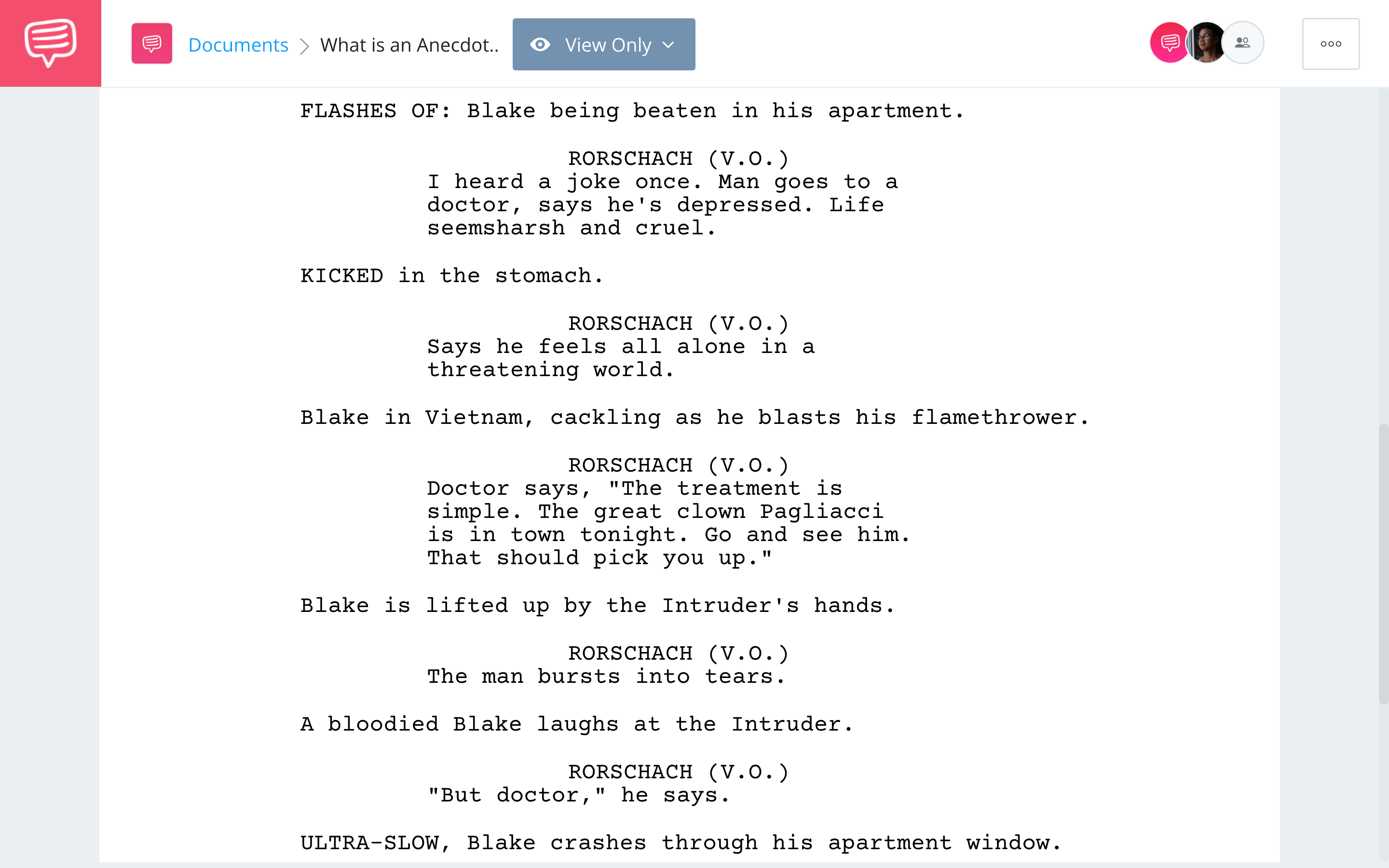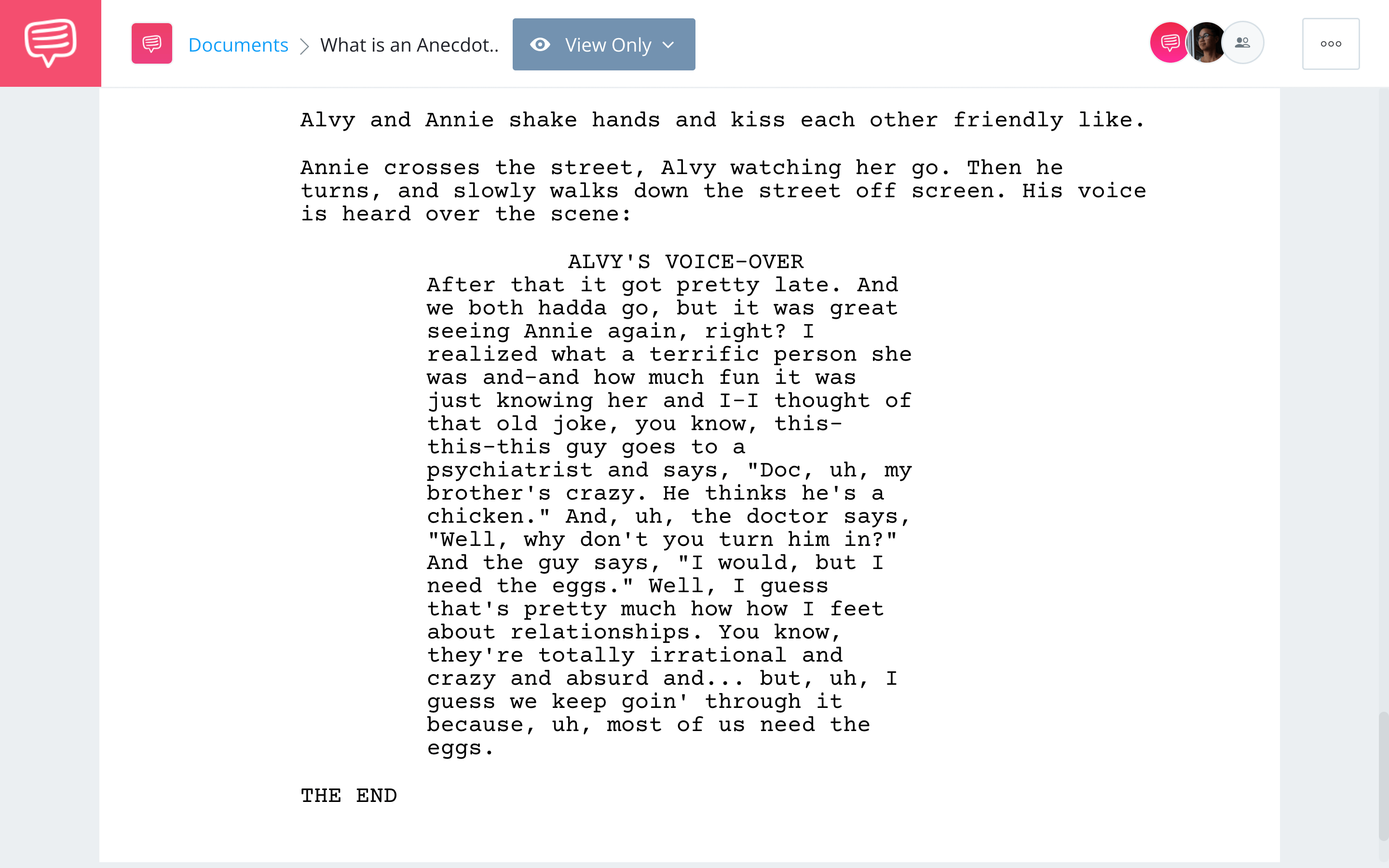What is an anecdote? In simplest terms, an anecdote is a short story that illuminates a nuanced facet of a greater subject matter. We’re going to break down anecdotes by looking at their definition — and anecdote examples in film and literature. By the end, you’ll know how to recognize and implement anecdotes in your own works.
How to Use Anecdote in a Sentence
First, let’s define anecdote
Anecdotes are used to add dramatic nuance to dialogue. For example: say two characters are having a conversation about whether or not to attempt “the big one” – a bank robbery they can retire on; but one character tells a short story about how when he was a kid, he’d always ride his bike down a dangerous hill, then one day, his luck ran out; his tire popped and he fell down the rock-covered hill, leaving him with a giant scar. This anecdote adds dramatic nuance to the two character’s dialogue and potentially foreshadows future events.
Anecdotes can also be used to support themes. Take Orson Welles’s best movie Citizen Kane for example. In this scene, Bernstein (Everett Sloane) tells a short story about a beautiful girl he once saw and how it relates to Kane’s final word: Rosebud.
What is an Anecdote in Writing • Anecdote Example in Citizen Kane
Both Kane’s final word and Bernstein’s anecdote symbolize forlorn desire. In many ways, this anecdote tells us the significance of “Rosebud” – but in a way so nuanced we don’t recognize it until the end.
ANECDOTE DEFINITION
What is an anecdote?
An anecdote is a short story — usually about a very specific subject matter — that’s told in order to illuminate a greater point regarding a situational, narrative or thematic principle. We tell each other these stories all the time in everyday life, usually humorous in nature. In storytelling, they can aid in characterization of the teller and/or their subject. Some movies like Big Fish quite literally use these "fish stories" as the crux of the conflict. Will Bloom tries to understand if the stories his father told him about his life were real or fantasy.
Types of Anecdotes:
- Humorous
- Inspirational
- Philosophical
- Reminiscent
- Cautionary
All Shapes and Sizes
Types of Anecdotes
Anecdotes can take many forms. There’s a few categories that the figure of speech can fall into, though they’re not ironclad — you’ll get different labels depending on who you ask.
Reminiscent
This is probably the most common type, especially if you’re talking to a grandparent. The reminiscence is essentially a person’s memory. You know you’re about to hear this type when someone says, “Back in my day…”
A few examples of a reminiscent anecdote:
- “I remember when I used to sit on my dad’s lap while he drove around town delivering mail.”
- “That reminds me of when the entire family gathered around the TV to watch Nixon resign.”
- “Back in my day I had to walk three miles to the watering hole just to brush my teeth.”
Humorous
A humorous anecdote is funny. Aptly named. These are just short stories designed to get a chuckle.
The humor usually comes from the context in which it’s told. Maybe your friend is getting his medical license, and you remind him of that time he thought he had Lyme’s Disease because he drank too much the night before.
Inspirational
An inspirational anecdote is a story that usually revolves around a person overcoming insurmountable odds. You know, something inspiring.
You will often hear these in politician’s speeches: “I was just talking to a farmer who lost her whole family in a rogue tornado, and thought she was done for. But she worked day and night to get her farm back into working shape. Today, she’s the head of Wells Fargo. That’s the power of the American Dream.”
Cautionary
The cautionary anecdote is usually employed on children or teens to get them to not do something. Think of something like, “I had a friend who smoked a cigarette once. Now she’s in jail for tax evasion.”
Philosophical
This type is for all the brainiacs out there. A philosophical anecdote gets people to think more deeply about a given topic.
Say, for example, a group of buddies are discussing the ethics of violence, and most of them are agreeing that violence is never justified. Then one of them says, “What about the Native Americans who in a last-resort act of self-defense fought to keep settlers from destroying their families and way of life?” A silence falls over the buddies as they reevaluate their position.
Related Posts
Anecdote Meaning
What does anecdote mean?
Anecdotes are stories about the past, and if one thing’s for certain: it’s that we often misrepresent the past. In The Dark Knight screenplay, The Joker flat-out deceives other characters by lying about how he “got his scars.”
We imported The Dark Knight script into StudioBinder’s screenwriting software to take a look at a scene where we know The Joker is using a misleading anecdote. As you’re reading, think about what benefit using a misleading recollection can have on a story.
Click the image below to read the entire scene.
Anecdote Definition Literature to Screen • Example in The Dark Knight
We know this story is misleading (but not necessarily untrue) because The Joker used a different version earlier in the story to explain “how he got his scars.” The goal of using a misleading anecdote is to keep the audience on edge. It tells us that we can’t trust the character, and in the case of The Joker, he may not even be able to trust himself.
Want to see the iconic scene in action? Check out the clip below.
Anecdote Examples in Movies • The Dark Knight
It’s moments like these that make Heath Ledger’s Joker one of the greatest depictions of the Batman villain (we ranked all of the best Jokers).
If you want to use an anecdote to mislead the audience, you need to set a precedent in which the character previously addressed the subject matter; or show us contradictory information in a flashback.
What is an Anecdote in Writing Used For?
How to use an anecdote
As you might have picked up at this point, an anecdote can be used towards a variety of ends. Here’s a couple general tips for how to best use them:
Illustrate a Point
When using an anecdote, you’re usually making a point clearer (unless you’re purposefully not, like Mr. Joker). So when you write out one, double check it to make sure it actually is helping you make your argument.
Here’s a good example of using an anecdote to make an argument: “When I was a kid, I depended on school lunch, since my family was barely making ends meet, and my mother often didn’t have the money to give us enough food. That’s why subsidized school lunches are so important — they make sure kids are getting the nutrients they need.”
Here’s a bad example: “George Washington once cut down a cherry tree, and when his father found out, he told him what happened because he couldn’t tell a lie. This is why I support subsidized school lunches.”
Establish a Mood
An anecdote can do a lot to establish the mood of a given speech, piece of writing, or scene. A good anecdote should read the room. In other words — if you’re writing a funny scene, a humorous short story will fit in well. If you’re writing a horror story, humor makes less sense (although, hey, there’s always exceptions to the rule).
Make Things Interesting
This is perhaps the most important guiding principle for an anecdote. They should spice things up; they should grab a reader’s attention. If they’re not doing that, then why are they there?
Related Posts
What is an Anecdote in Writing Used For?
Use anecdotes to build a world
Sometimes, anecdotes can say more about the world of a film than anything else. In this regard, I can think of few better examples than that of the “Pagliacci joke” in Watchmen.
Let’s take a look at the Watchmen script to see how this ironically humorous tale sets the tone for the story. Click the image to read the entire scene, including the punchline.
How to write an anecdote like Watchmen
Here, Rorschach’s joke establishes the singular tragi-comedic tone of Watchmen. It tells us that at its surface, the world of Watchmen is superficial, but underneath, it’s teeming with darkness.
Check out the iconic scene from Zack Snyder’s movie version below – and read our breakdown of Looking Glass from the Watchmen TV show for more on the world of Watchmen.
What Does Anecdote Do? • Anecdote in Watchmen
If you want to use an anecdote to build the world of your story, consider being overt — like screenwriter Alex Tse (based on Watchmen by Alan Moore) is in this example.
Purpose of Anecdote Comedy
Anecdotes can be jokes too
Wikipedia states that “anecdotes differ from jokes because their primary purpose is not simply to provoke laughter but to reveal a truth more general than the brief tale itself.”
Essentially, they should speak to a greater truth of the world.
With that said, many “jokes” in Woody Allen’s best movies can be characterized as anecdotes. Allen frequently blends fictional jokes with real (film world) events to create quasi-anecdotes that blend the line between narrative and autobiography; Annie Hall is the epitome of this point.
Let’s take a look at the ending of Annie Hall to see how Allen and co-writer Marshall Brickman effortlessly weave drama and humor through an anecdote.
What is an Anecdote? • Anecdote in Annie Hall
We can say this monologue is an anecdote for two reasons: the first is that it addresses “realism” in the story (about Alvy and Annie’s relationship). The second is that it speaks to a great point about the world; which is to say that relationships are a crucial part of surviving. Of course, we can also say the anecdote is a metaphor because Alvy compares himself to the guy in the story.
Purpose of Anecdotes
Anecdotes in Literature
Anecdotes abound in literature, ranging from small examples to entire chapter-long detours. As such, there are countless iconic examples of anecdotes in books.
Swann’s Way, Marcel Proust
One of the most famous anecdotes can be found in Proust’s crowning achievement, Swann’s Way. The book revolves around memories, and Proust uses the anecdotal form when he bites into a madeleine cookie.
The taste quickly reminds him of another time long ago when he was eating the same snack.

Ah… the memories
The madeleine story is one of literature’s finest reminiscent anecdotes.
The Great Gatsby, F. Scott Fitzgerald
“‘I’ll tell you a family secret,’ she whispered enthusiastically. ‘It’s about the butler’s nose.’”
There’s a number of anecdotes in Fitzgerald’s most famous work. Gatsby deals with people haunted by their pasts, so it only makes sense. One of the most beguiling examples is Daisy Buchanan’s story about her family butler, which readers and literary scholars have been dissecting to this day.
“Consider the Lobster,” David Foster Wallace
“The enormous, pungent, and extremely well-marketed Maine Lobster Festival is held every late July in the state’s midcoast region, meaning the western side of Penobscot Bay, the nerve stem of Maine’s lobster industry.”
David Foster Wallace is one of the great essayists, and with his most famous essay, he illustrates how instrumental an anecdote can be to the form.
Wallace visited the Maine Lobster Festival, and uses the pretty run-of-the-mill experience to delve into the history of lobsters, discuss the ethics of eating lobsters, the ethics of eating sentient creatures at all, all before returning once more to the festival anecdote.
If you think essays are boring high school assignments, read “Consider the Lobster” and think again.
Related Posts
Up Next
What is a Flashback?
Anecdotes are short stories that illuminate light (or insight) on a greater point of a subject matter. In many ways, flashbacks are very similar – but they’re differentiated by how they always take place in the past. In our next article, we break down flashbacks with examples from Big Fish, Manchester by the Sea, and more. By the end, you’ll know how to effectively implement flashbacks in your own writing.



